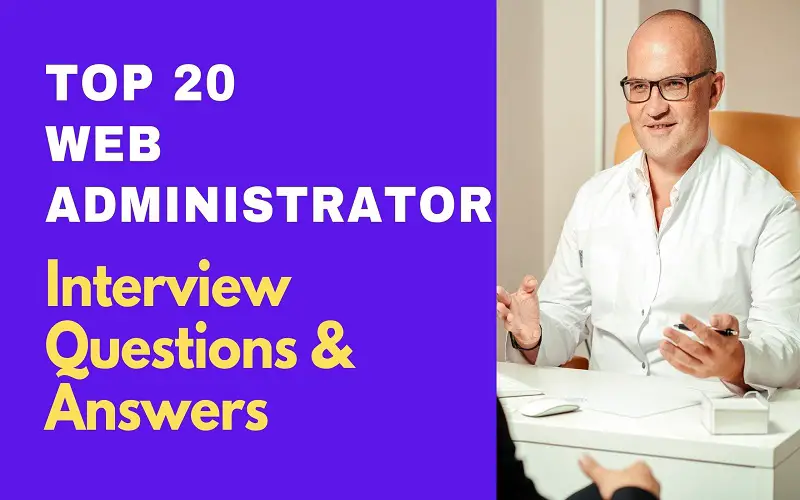Web administrators (sometimes known as webmasters) are responsible for the general upkeep of a company’s website. To keep sites functioning effectively, web administrators ought to have a deep technical understanding of web maintenance, and they should have the ability to connect with the engineers and other team members. Companies will look for people with a computer science or web design diploma or graduate degree.
So here are the top 25 web administrator interview questions and answers that will help you during the interview section.
1. Why Are You Interested In This Role?
I am interested in this role as my education and my career line both support this role. I am interested in technical knowledge, so I selected this field as a part of my education and career. I’m sure if this role is assigned to me, then I can not only handle it well, but it will also increase my experience and potential to rise as a web administrator.
2. What Are The Roles Of A Web Administrator?
To get a website running, set up a web host, set access for users, develop news and mail servers, and safely connect databases. Other back-end components, as well as constantly evaluate website performance by evaluating figures such as loading time and memory usage.
These are the few major roles of web administrators. Still, web admins are also responsible for the assessment of user feedback, effectiveness, and traffic, and they also explore marketing techniques like newsletters and SEO to get more users into the website.
3. What Are The Qualities That A Web Administrator Need To Be Successful?
Web administrators should have good technical skills and problem-solving abilities, as well as working expertise in both web development and system administration. Because this profession deals with numerous aspects of the web, from infrastructure to content, a desire to learn new things is beneficial. To succeed, web administrators must know about web development, infrastructure, testing, dependability, and customer service.
4. What Major Challenges Did You Face During Your Last Role? How Did You Manage Them?
The major challenge that I faced during my last role was to bring quality traffic to the site that I used to manage and maintain its position due to high competition. For this, I developed a clear strategy to beat my competitors in content and loading time and managed to hold my current position.
Related Articles:
- Top 20 Active Directory Administrator Interview Questions and Answers
- Top 20 Database Administrator Interview Questions & Answers
- Top 20 System Administrator Interview Questions and Answers
- Top 18 Network Administrator Interview Questions & Answers
- Top 20 Systems Engineer Interview Questions and Answers
- Top 25 Systems Integration Engineer Interview Questions and Answers
- Top 25 IT Analyst Interview Questions and Answers
5. Describe Your Daily Routine As A Web Administrator?
I daily used to back up my applications data to counter any emergency issues and evaluate web page sources or server problems and take the desired actions to fix those errors. Daily, I monitor systems for viruses and report data breaches to the proper personnel. Aside from that, I schedule time for web development through education, reading, or attendance at professional conferences, workshops, or groups as part of my daily routine.
6. Describe Briefly About Your Experience
During my educational period, I engaged in carrying out a few web administrator activities. I developed my site when I was in college. So I had a little bit of information regarding the servers and networking etc., at that time even. This gave me a boost during my studies as well. Finally, after graduating, I got a chance to work with a local firm Web. inc, for 5 years, where I polished my skills even further and carried out all the tasks and activities that I have mentioned before.
This also led me to build communication skills and learn ways to work in groups and teams professionally.
7. What Kind of Strategies and Mindset is Required for This Role?
Most of the time, the basic strategies that are required for this role can vary from choosing reliable network administration training to infrastructure expertise so that you can enhance your knowledge and get things done in the correct order. The overall thought that should be revolving around your head must include that no matter what happens, you should perform such activities that can give a boost to the overall performance of the company and make things easy for the firm so that it can maintain its position.
8. What Is the Biggest Challenge That You Foresee in This Job?
It is obvious when you move from one company to another or from one job to another, at a greater or different scale, you find challenges. After studying the entire requirements for the position, I did not find any tough area that will require my extra attention but still, if there will be many challenges in the future, then I’m pretty sure that working as a team will sort them out.
9. How Do You Stay Motivated in Your Work?
The main thing that keeps me motivated is responsibility. Once I commit something, I will try my best to perform it correctly because it is the belief that owners and other members of your team put on you, and I try my best to meet up their expectations.
10. Describe A Time When You Failed In This Role And The Lesson You Learned?
I once failed when my boss gave me the responsibility for the network maintenance, where I had to communicate to the team of engineers and meet the deadline, and I took it easy. This taught me to work in a group and gave me a sense of responsibility to never break the trust of my superiors or anyone who relies upon me.
11. Why Do You Feel You are The Most Suited for This Role?
I have all the expertise that is required for this role. Apart from this, I am passionate about the position, and when you love something, you do it perfectly. My education and certificates indicate that I’m the best fit for this role, and I am determined to work hard and maintain the company’s position.
12. Share With Us Your Greatest Achievement.
My greatest achievement is trust. I have only tried those things that I can perform best and never showed commitment towards those I cannot do well. This led me to trust my superiors by showing my honesty towards various tasks. It’s not like I don’t take chances because if you don’t take chances, you stop growing. But my clear communication showed my superiors that I am an honest guy, and I clearly demand extra time if I think that this task will take more effort from my side so that I don’t miss the deadlines.
13. What is HTTP and what port does it use?
The HyperText Transfer Protocol, or HTTP, is the primary protocol for delivering web content on the Internet. This protocol is still used by most websites to send primary website content and to show and navigate ‘hypertext’ or links. While HTTP can employ a variety of carrier protocols to transfer data from one system to another, TCP port 80 is the most often used protocol and port.
14. What is HTTPS and what port does it use?
HTTPS, or Secure HTTP (not to be mixed with SHTTP, which is a whole other standard), is HTTP’s older sibling. HTTPS was created to be utilized for identity verification, and it makes use of SSL certificates to ensure that the server you’re connected to is one it claims to be. While HTTPS provides some encryption, it is frequently judged insufficient, and further encryption methods are sought wherever possible. TCP port 443 is used for HTTPS transmission.
15. Define IP Classes?
There are four sets (octets) of numbers in the IP address that most people are aware of (IPv4), each with a value of up to 255. The number of potential hosts that an IP class can handle on a single network is what distinguishes them. The more networks supported by a specific IP class, the smaller addresses each network has.
16. What is a Firewall?
A firewall prevents things from communicating from one end to another. Firewalls are available in a wide range of hardware and software forms and network and host options. When Windows XP SP2 was released, it included Windows Firewall, which was most people’s first exposure to firewalls.
17. How Will You Define Proxy Servers?
A proxy server caches the contents of those websites, similar to how a DNS server caches the addresses of accessible websites and does the heavy work of search and retrieval for users. Proxy servers can also keep a list of blacklisted and whitelisted websites to keep users safe from viruses that are readily avoidable. Proxy servers can also track user web activity to ensure that sensitive information does not leave the premises, depending on the company’s aims.
18. What Is The Difference Between A Workgroup And A Domain?
A workgroup is a set of systems having their own set of rules and local user logins associated with it. A domain is a group of systems connected by a centralized authentication server that informs them of the rules. While workgroups function well in small groups, it gets progressively difficult to handle rights and sharing if the number of systems exceeds a certain threshold (often 5 systems).
19. Did the offered pay package motivate you to apply for this Web Administrator position?
The compensation was quite appealing, but it was the job itself that drew me in. I am keen to work with your firm apart from the salary perspective. No doubt, salary is important, but I truly want to become part of your firm and provide my expertise.
20. What programming languages have you worked with before?
I have experience in HTML, CSS, PHP, and SQL. Apart from this, I have command over Laravel framework and Javascript. Many sites are created using WordPress nowadays, but still, languages have the strongest grip.
21. What is the importance of Doctype in HTML?
Doctype tells the browser which version of the HTML/XHTML is being used and how to render the page. These standards are essential to carry out the codes written using the HTML language. Without this, the browser will not get an idea about the version of the HTML/XHTML.
22. What is your biggest weakness?
I sometimes get sidetracked by small details due to excess work. Usually, I get back to the details, but sometimes it takes time because I think too much about other people around me and their trust, so it makes me a little bit nervous as well.
23. Do you have any expertise with tracking tools and software?
Google Analytics is the best tool for keeping track of the audience visiting your site. I often use it, and almost every user in the field of web administration uses it. Apart from this, for SEO purposes, I use Ahref and Google Keyword planner tools to rank my site better in the Google and other search engine results.
24. What are some of the most typical causes for a slow-loading website? How can you fix them?
Slower results can be caused by various factors, including poorly optimized graphics, too many scripts, a lack of cache plugins, unstructured coding, and poor server performance. I plan to conduct website speed tests to identify areas for improvement and solve them as they arise until the website receives a perfect score and loads quickly on all devices, except those with bad internet connections.
25. Do you have any questions to ask us?
Sir, with your permission, I’d like to receive my feedback so that I can examine and enhance my strengths while also correcting my flaws. This will improve my self-confidence and put me in comfort so that I can further increase my motivation. Thank you.
Conclusion:
The interview for a position as a web administrator falls under the category of average challenging interviews. In the recruitment process, your experience is crucial, and you should be able to show it with a professional resume.
So these were the best 25 web administrator interview questions and answers. We hope that these will help you in your interview. Remember, communication is the key. Always give answers with confidence, and you will get success in every field of life.




